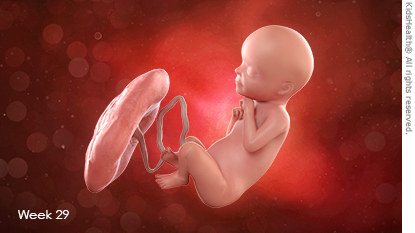- Home
- Humana Medicaid
- Kentucky Medicaid
- Medicaid extras
- Health and wellness
- Parents Home
- Para Padres
- A to Z Dictionary
- Allergy Center
- Asthma
- Cancer
- Diabetes
- Diseases & Conditions
- Doctors & Hospitals
- Emotions & Behavior
- First Aid & Safety
- Flu (Influenza)
- Food Allergies
- General Health
- Growth & Development
- Heart Health & Conditions
- Homework Help Center
- Infections
- Newborn Care
- Nutrition & Fitness
- Play & Learn
- Pregnancy Center
- Preventing Premature Birth
- Q&A
- School & Family Life
- Sports Medicine
- Teens Home
- Para Adolescentes
- Asthma
- Be Your Best Self
- Body & Skin Care
- Cancer
- Diabetes
- Diseases & Conditions
- Drugs & Alcohol
- Flu (Influenza)
- Homework Help
- Infections
- Managing Your Weight
- Medical Care 101
- Mental Health
- Nutrition & Fitness
- Q&A
- Safety & First Aid
- School, Jobs, & Friends
- Sexual Health
- Sports Medicine
- Stress & Coping
Pregnancy Calendar: Week 29
Your Baby's Development
Your baby continues to be active, and those first few flutters of movement  have given way to hard jabs and punches that may take your breath away. If you notice a decrease in movement, do a fetal kick count: Your baby should move at least 10 times in 2 hours. If your baby moves less, talk to your health care provider.
have given way to hard jabs and punches that may take your breath away. If you notice a decrease in movement, do a fetal kick count: Your baby should move at least 10 times in 2 hours. If your baby moves less, talk to your health care provider.

Your Body
 During pregnancy, iron is important for replenishing the red blood cell supply. You should be eating at least 30 milligrams of iron each day. Because iron deficiency is common during pregnancy, your health care provider may recommend that you have a blood test to check your iron level. If it's low, you may be prescribed an iron supplement.
During pregnancy, iron is important for replenishing the red blood cell supply. You should be eating at least 30 milligrams of iron each day. Because iron deficiency is common during pregnancy, your health care provider may recommend that you have a blood test to check your iron level. If it's low, you may be prescribed an iron supplement.

© 1995- The Nemours Foundation. KidsHealth® is a registered trademark of The Nemours Foundation. All rights reserved.
Images sourced by The Nemours Foundation and Getty Images.